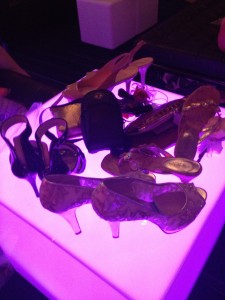 Lunch with, Joyce, the winner of the Brenda Novak Auction prize that Carolyn Crane and I sponsored. We took her out to lunch at the RWA convention and gave her all the best advice we could come up with on planning the next stages of her career. It was very fun and we wish her well!
Lunch with, Joyce, the winner of the Brenda Novak Auction prize that Carolyn Crane and I sponsored. We took her out to lunch at the RWA convention and gave her all the best advice we could come up with on planning the next stages of her career. It was very fun and we wish her well!
A theme that came up for me over and over at this convention was looking at the long-term career. It seemed we heard a lot of stories about writers who’d lasted through the ups and downs of the industry – and those who hadn’t. One gal I met had written for Kensington – my same publisher – back in the 1990s. She wrote nine books for them, in fact, then was dropped during one of the downturns. Her husband also divorced her at the same time. By the time she sorted out her life, she discovered her writing career had tanked without her noticing.
Quite the cautionary tale.
Oh, sure, you can make judgments here. Having an agent would have helped. She likely missed signals, should have been paying better attention, but the fact remains that she “made it.” She had nine books with a very good publisher. And POOF. Gone.
During the same conference, I attended one of my favorite workshops, The Secrets of the Bestselling Sisterhood, put on by long-time career pals and friends, Jayne Ann Krentz and Susan Elizabeth Phillips. They often put their long careers in terms of their longevity when so many other very good writers have not survived. From their discussion, I tweeted:
If you’re in this business any length of time, your genre will go out of style. Find your core story and be ready to change genres
#RWA13
I was amazed at how many people picked up that tweet, saved it in favorites and passed it around.
Upon consideration, however, I realize I shouldn’t be surprised. It’s excellent advice. Their point is – and this is mainly from Krentz, who has reinvented herself as an author several times – that the core story is the key. Whether you tell the story framed in fantasy or romance, with vampires or with regency-era dukes, with spaceships or sailing ships – those things are all external trappings. The heart of the story is what we love and want to read. And write.
All of this bears thinking about, much as we might not want to. The way the industry is, a huge amount of our focus and struggle goes into the effort to just get on the playing field. Getting Published might not be the high bar it once was, with the many options available today, but it’s still the enormous first step. It’s easy to see all the effort on the front end and forget the ongoing work.
But, like with marriage, while it’s tempting to see the wedding as the culmination of the quest – the search, courtship, engagement and ceremony are complete – it’s truly only the gateway into the thing itself. A lifetime of marriage is a continuing, evolving effort. We can no more let our writing careers go than we can take our spouses for granted and assume they are a done deal.
Food for thought.
 Lunch with, Joyce, the winner of the Brenda Novak Auction prize that Carolyn Crane and I sponsored. We took her out to lunch at the RWA convention and gave her all the best advice we could come up with on planning the next stages of her career. It was very fun and we wish her well!
Lunch with, Joyce, the winner of the Brenda Novak Auction prize that Carolyn Crane and I sponsored. We took her out to lunch at the RWA convention and gave her all the best advice we could come up with on planning the next stages of her career. It was very fun and we wish her well!